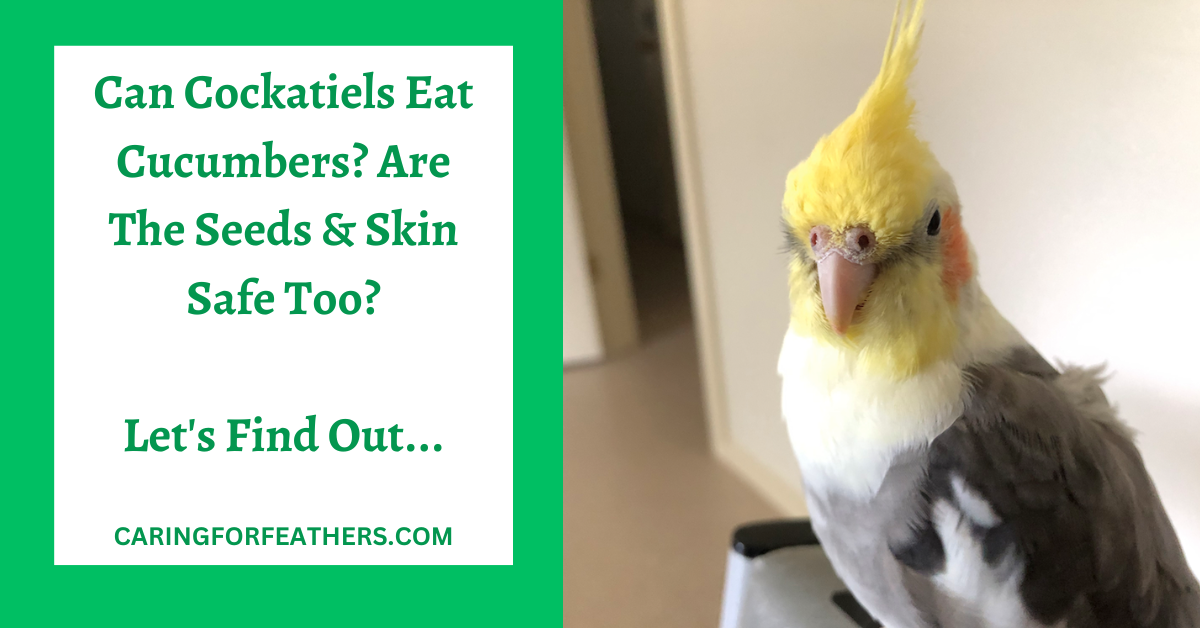Can Cockatiels Eat Cucumbers? Is The Skin Safe? 🥒

“Can my cockatiel eat cucumber?”
Cucumbers are honoured members of the cucurbit plant family, making them related to melons, pumpkins, and squash. They’re also safe for our cockatiels to eat, which is great news for us cucumber lovers!
Cucumbers contain many vitamins, minerals, and nutrients that greatly benefit our cockatiels.
But what about the cucumber skin? Are they safe for cockatiels too?
Are the cucumber seeds also safe?
This article aims to answer all questions you may have about cockatiels & cucumbers!
Starting with the most commonly asked question…
Can Cockatiels Eat Cucumber Skin?
Cucumber skin, as well as the juicy inner fruit, are safe for cockatiels to consume.
In fact, cucumber skin contains additional nutrients not found within the inner fruit, such as fibre and beta-carotene. Beta-carotene helps boost the immune system and improve eyes and skin health. (LiveScience)
Cucumber peels also have a satisfying crunch that will please your bird while they eat it!
I think my cockatiel loves crunching the peels more than actually eating it 😂
Considering the added benefits of cucumber skin, the best way to serve cucumber to your cockatiel is unpeeled.
This will ensure they get as many beneficial nutrients as possible.

Can Birds Eat Raw Cucumbers?
Raw cucumbers are just as safe for cockatiels as cooked cucumbers.
According to Dr Neha Sanwalka, cooking cucumbers causes a loss of nutrients, so it’s actually better for cockatiels to eat them raw. Additionally, raw cucumbers have that satisfying crunch that boiling would soften.
And if your bird is anything like mine, a lack of crunch is simply unacceptable.
Try experimenting with different cooking methods to see how your cockatiel prefers their cucumber!
Are Cucumber Seeds Safe For Cockatiels?
Yes, cockatiels can safely eat small amounts of cucumber seeds.
There are a variety of nutrients hidden within cucumber seeds that may boost heart health in your cockatiel (WebMD). Additionally, cucumber seeds are a good source of calcium, manganese, iron, and zinc, all of which are nutrients beneficial to cockatiels.
Many fruits, like apples, cherries, and apricots, contain seeds that are toxic to birds.
But cucumbers are one of the few fruits whose seeds are perfectly safe.
Not only are they safe, but they also provide extra benefits, so keep those seeds intact!

Do Cucumbers Contain Pesticides?
Pesticides are used on almost all in-store cucumbers for preservation purposes.
Since this preservative is toxic to cockatiels, you must thoroughly rinse the cucumbers before serving them. You should do this for all fruits and vegetables you give to your cockatiel as a general rule of safety.
How Often Should Cucumbers Be Offered To Cockatiels?
Despite looking like a vegetable, cucumbers are actually fruits, just like apples and bananas.
And like all other fruits, cucumbers must only make up 5% of your cockatiel’s overall diet, according to my vet-approved diet plan. You also don’t want to feed too much cucumber as it’s comprised of 96% water.
Yes, this means cucumbers are mainly just water.
When cockatiels eat too much cucumber, they’re mainly filling up on water…
This leaves less room for more nutritionally packed foods like pellets and vegetables, which isn’t ideal.
High water intake can also irritate their guts and cause watery droppings.
So, how often should you feed cucumber to cockatiels?
My suggestion is to feed no more than 1 or 2 servings of cucumber per week.
Cucumbers should be served alongside other fruits and vegetables for more nutritional value.
What Other Fresh Fruits Can Cockatiels Eat?
Cucumbers are just one of many fruits you can feed to your cockatiels. In fact, your bird will probably benefit more from eating other fruits with lower water content. Below are some other fruits you can serve alongside or in replacement of cucumber:
- Bananas
- Apples
- Grapes
- Blueberries
- Strawberries
Related: Full List Of Safe & Nutritious Fruits For Cockatiels
Are Pickled Cucumbers Safe For Cockatiels?
Generally, pickles and pickled cucumbers are not safe for cockatiels.
In order to turn a cucumber into a pickle, it must marinate in acidic liquids often made up of high salt or vinegar levels. Apple cider vinegar is safe in tiny amounts, but salt does not agree with cockatiels at all, even in small doses.
Not to mention that pickle brine is highly acidic, which is also not good for birds.
Because of this, it’s best to keep pickles to yourself.
Instead, you should only feed fresh cucumbers, raw or cooked, but not pickled.

Benefits Of Cucumber For Cockatiels
Although cucumbers are primarily water, they still contain a good amount of nutrition that will benefit your cockatiel. Below is the nutritional content your bird receives per 100 grams of fresh cucumber:
- Calories = 15
- Dietary fibre = 0.5 grams
- Sugars = 1.7 grams
- Protein = 0.7 grams
- Potassium = 147 milligrams
- Carbohydrates = 3.6 grams
Info source: NutritionIX
Additionally, cucumbers are a good source of vitamin K and certain antioxidants.
Due to the water levels, cucumbers also help keep your bird hydrated.
Short Summary
In conclusion, cucumbers make for a good occasional snack for cockatiels.
Their high water content will keep your bird hydrated and the nutritional content will keep your bird healthy when fed in limited amounts. Not only can cockatiels eat the inner fruit, but they also love the cucumber seeds and skin.
Both the cucumber peel and seeds are safe for birds.
Since store-bought cucumbers contain pesticides, you must thoroughly wash them before serving them to your cockatiel. Once they’re cleaned, cucumbers can be served raw or boiled, but it’s best to serve raw due to their higher nutritional content.
The only type of cucumber that can’t be offered is pickled.
Pickled cucumbers are soaked in high levels of vinegar and salt, which aren’t good for birds.
Hopefully, this article has cleared up any confusion you may have had about cucumbers and cockatiels.
Thank you for reading!



0 Comments